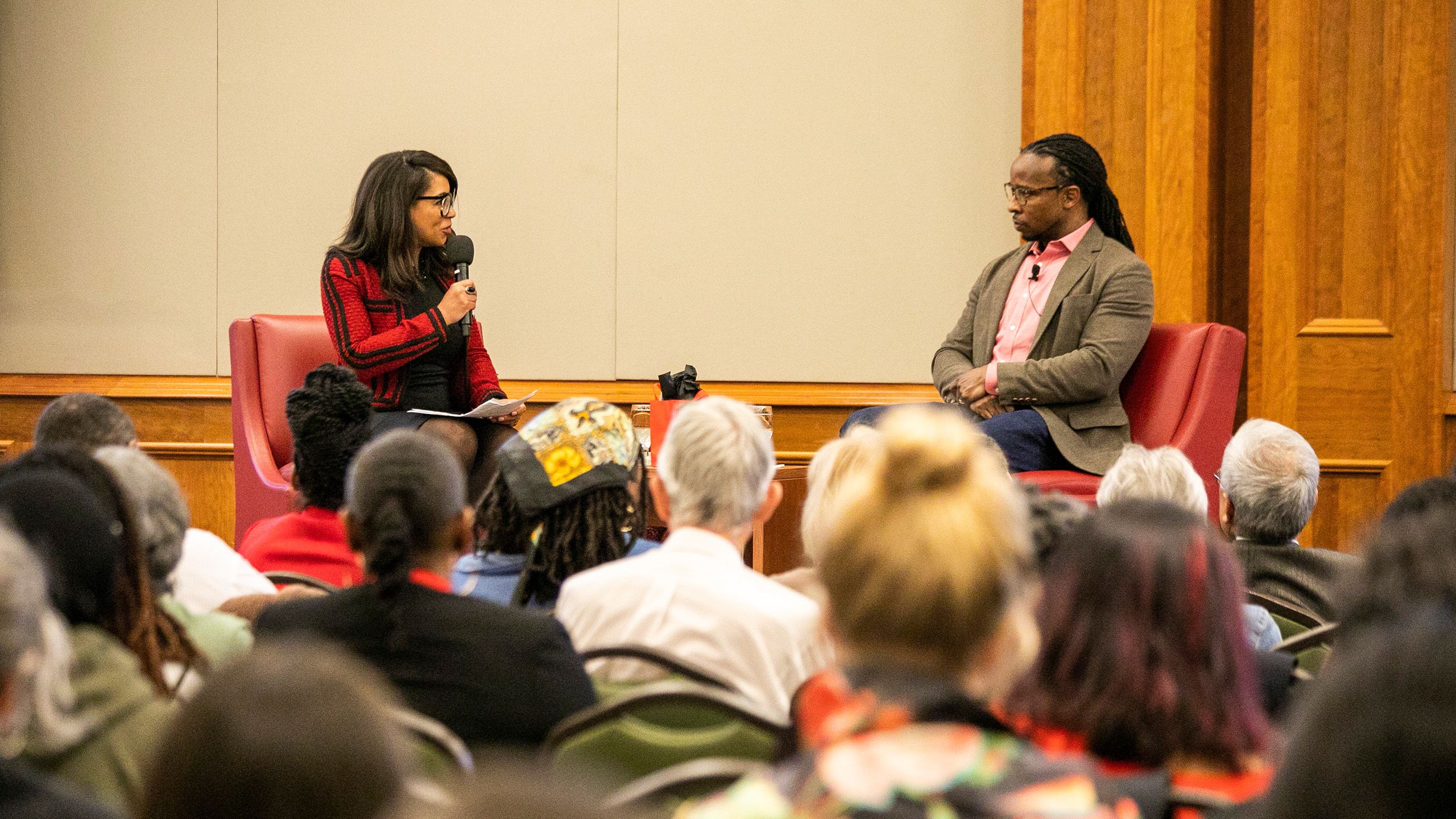Five-Time New York Times #1 Bestselling Author Ibram X. Kendi Captivates Rutgers–Camden at Chancellor’s Lecture Series on Global Racial Reckoning and Civility

Chancellor Antonio D. Tillis's bold vision for the Chancellor's Lecture Series on Global Racial Reckoning and Civility came to fruition for the second consecutive year on Monday, March 27, as a standing-room-only crowd of more than 250 faculty, staff, students, alumni, and members of the Rutgers Board of Trustees gathered at Rutgers University in Camden for a keynote speech by five-time #1 New York Times bestselling author Ibram X. Kendi. The esteemed scholar and thought leader, whose work has shaped the national conversation on race and social justice since his book How to Be an Antiracist was released in 2019, took the stage for a thought-provoking, candid conversation moderated by Stacy Hawkins, senior professor and vice dean at Rutgers Law School.
“When I launched this new tradition here at Rutgers–Camden, I did so with an eye toward providing our campus and our region with timely opportunities to hear that which was trending most in our nation and globally,” Chancellor Tillis said. “Rutgers–Camden is an institution central to the study of race and equity. Dr. Kendi’s talk will add to our understanding of who we are as a community.”

Ibram X. Kendi and Rutgers University–Camden Chancellor Antonio D. Tillis
Ibram X. Kendi and Rutgers University–Camden Chancellor Antonio D. Tillis

Kendi, a National Book Award-winning author and historian of race and discriminatory policy in America, became a household name during the global racial reckoning of 2020. That same year, he was named director of the Center for Antiracist Research at Boston University.
Before Kendi became an internationally known figure, however, he was a student just like those in the audience, earning mediocre grades in high school—he recalled obtaining the minimum “two C’s and three D’s” required to remain on the basketball team. He would go on to obtain a doctoral degree in African American studies, and was named included in Time's 100 Most Influential People of 2020.
“I didn’t even know if I was college material,” Kendi said. “I mention that because I suspect some students here at Rutgers–Camden at some point in their lives were questioning whether they were college material…My culture was affirmed and my teachers expected me to perform at a very high level. When I didn’t, they challenged me. I would not be who I am today if I wasn’t nurtured in that space.”

The conversation then turned to Kendi’s 2016 book, Stamped from the Beginning, which Hawkins noted struck a chord with readers and cemented Kendi’s reputation as a leading scholar.
“The book struck a chord because it demonstrated there was nothing wrong with Black people and everything wrong with those who have been describing Black people as problematic over the last six centuries,” Kendi said. “Those ideas did not emerge out of ignorance and hate. Those ideas were used to substantiate racist policies, leading to all sorts of racial disparities, and creating the sensation that the cause of those disparities was Black people instead of racist policies. Then, people consume those ideas and become ignorant and hateful toward Black people.”
Kendi credited Black students past and present with inspiring him to write his books and providing the structural framework that has made his work possible.
“Students said we needed a new discipline that wasn’t conceiving of Black people as inferior,” Kendi said. “That’s one of the reasons they called for Black studies. So, inspired by the students, I wanted to set the record straight.”
Kendi struck an optimistic tone that seemed to resonate with and motivate audience members when Hawkins asked about his belief that racism is “curable.” While many scholars of race believe inequities can never truly be solved, Kendi encouraged the audience to imagine the full extent of what antiracist efforts may achieve.
“Racism is a largely modern phenomenon—it’s only really been alive for 600 years. Sexism existed in antiquity,” Kendi said. “When we compare racism to other bigotries, it is one of the newest and youngest. In many ways, we caught it early. If someone said to me that it’s impossible to eradicate racism, I’m not going to deny that. It was impossible for enslaved Africans in Haiti, when they rose up in 1791, to imagine that in thirteen years they would defeat armies from France, England, and Spain in succession. There are so many things that have happened in human history that have literally been impossible…You can acknowledge the reality of its possibility and simultaneously believe that it is possible, which then fuels you to challenge it day in and day out.”

Creative Design: Karaamat Abdullah
Photographer: Ron Downes, Jr.